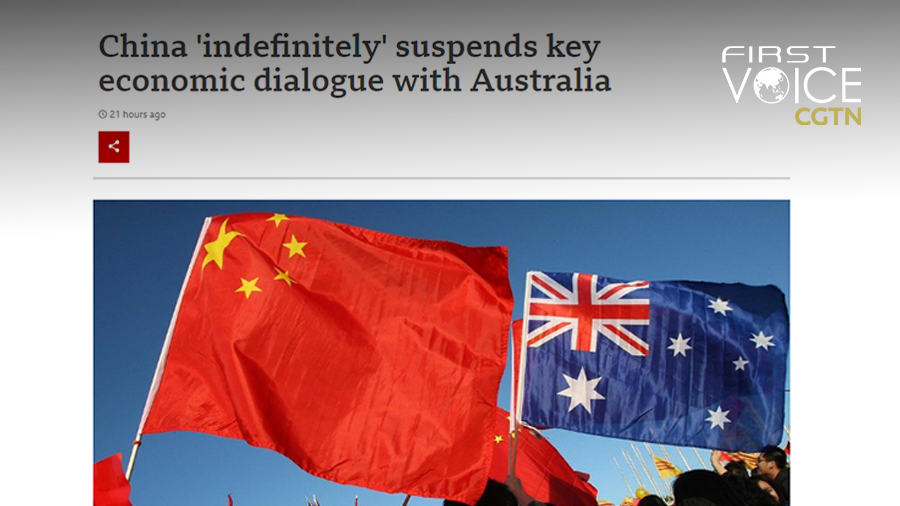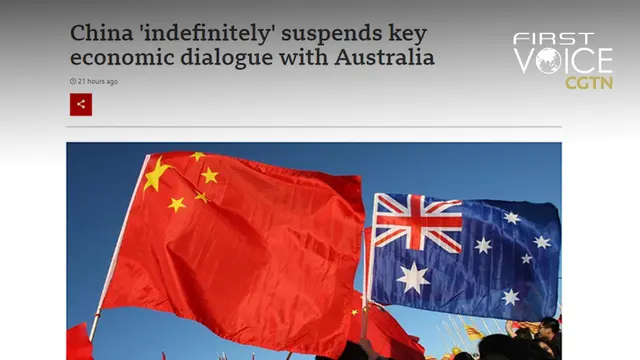
Editor's note: CGTN's First Voice provides instant commentary on breaking stories. The daily column clarifies emerging issues and better defines the news agenda, offering a Chinese perspective on the latest global events.
China's Foreign Ministry on Thursday announced "indefinite suspension" of its Strategic Economic Dialogue with Australia, accusing Canberra of harboring a "Cold War mindset and ideological discrimination" against China
Although Canberra will choose to inevitably play the victim again, this situation is a product of Australia's increasingly bad faith, hostile and contentious relationship towards China across the board. China is not coercing or bullying Australia but responding to a never-ending projection of malicious behavior from this country that has derailed bilateral ties.
Actions have consequences, and Beijing is taking justified actions in reaction to Australian Prime Minister Scott Morrison's immature and destabilizing behavior.
The move comes just a week or so after Morrison annulled Victoria's participation in the Belt and Road Initiative, and is looking into the same thing at the privately owned port of Darwin, which has a Chinese lease.
Several days ago, the Sydney Morning Herald led with the headline, "War with China a 'high likelihood': top ADF soldier." This headline is a perfect representation of Canberra's attitude towards Beijing in general – paranoia, hostility, suspicion and aggressive behavior.
That was not an isolated mention. Last week, the country's Defense Secretary Peter Dutton also spoke of a war scenario with China on the Taiwan Straits.
Australia has collectively and comprehensively lost its mind on how to manage its relationship with its biggest trading and export partner.
First of all, Morrison's government must take a share of the blame. It has been hostile, unpleasant, and aggressive in handling the China issue, choosing to orient his country's foreign policy too close to the United States and act like a sycophant to Washington. Its call last year for an "independent" investigation into the origins of the coronavirus speaks for its loyalty to Washington.
Secondly, Australia's lopsided media, dominated by right-wing Newscorp, has also whipped up a climate of insecurity, McCarthyism, and suspicion regarding all things China. This has had a disproportionately negative impact on the Beijing-Canberra relationship.
Thirdly, dubious think tanks such as the Australian Strategic Policy Institute (ASPI), funded by the U.S., and the arms industry have also pioneered the decline in relations and consolidated the anti-China narrative.

The office building where the Australian Strategic Policy Institute is located, in Canberra, Australia. /Xinhua
The combination of these factors has stifled any reasonable, balanced, and moderate outlook in Canberra's view and debate concerning Beijing and led to the collective bullying, harassment, and insinuation of anyone who has attempted to advocate a level-headed view or question the dominant narrative.
Thus, China aptly blames Australia for a Cold War mentality. In this case, Beijing does not see fit to increase economic engagement and strategic dialogue with a country that maintains a belligerent attitude against it.
U.S.-sponsored think tanks like to dub China's treatment of Australia as "economic coercion." But this is a misleading, one-sided term that advocates that hostile countries have the right to profit from China's markets whilst treating it like an enemy, a logic comparative to the notorious Opium Wars.
Beijing would like to be reasonable and open in its relationship with Canberra, but Australia's behavior ultimately gives it little other choices. These decisions are purely retaliatory.
When Australia drops its comprehensive paranoia and conducts its relationship with China with reason and moderation, Beijing will be ready to talk. However, if it continues on this path and if Canberra likewise decides to tear up the Darwin Port lease, China will have no other option but to respond further to safeguard its interests. Australia cannot both have its cake and eat it too.
(If you want to contribute and have specific expertise, please contact us at [email protected].)
 简体中文
简体中文

